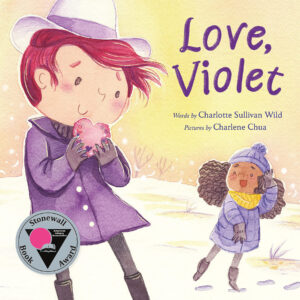This past Friday, June 27, the U.S. Supreme Court issued a blow to public school education and the freedom to read with their ruling in Mahmoud v. Taylor, allowing a preliminary injunction to remain in place for a small group of Maryland parents seeking to opt their kids out of LGBTQ-inclusive children’s books at school.
The nine authors and illustrators named in the case issued a joint statement following the decision, slamming the ruling and stating in part:
“We created our books for all children. We believe young people need to see themselves and families like theirs in the books they read; this is especially true for LGBTQ+ children and LGBTQ+ families. And all children need to learn how to share their classrooms and communities with people different from themselves. Books can help them understand one another and learn to treat each other with acceptance, kindness and respect.
We know there are families and educators across the country who are committed to creating inclusive classrooms that meet the needs of the diverse groups of students in their school districts. We are with them in spirit as they work to ensure that all students are seen and supported.”
In addition, several of the individual authors and illustrators have distributed their own statements about the reasons they wrote their books and why the justices got it so wrong. “Uncle Bobby’s Wedding,” the story of a young girl who fears she will spend less time with her uncle after he gets married to his partner, was featured prominently in both the oral argument and final ruling surrounding the case. The author of that book, Sarah Brannen, penned a statement that exposed the harmful consequences of banning books like hers and creating an a-la-carte public education system where not all students receive the same standard of learning:

“The Supreme Court’s decision in Mahmoud v. Taylor will have dire consequences for public education and LGBTQ+ children and families. Allowing parents to remove their children from class on the mere mention of the existence of LGBTQ+ people will stigmatize and harm other children in the class. LGBTQ+ children and families are not something anyone needs to be shielded from.
We are all human beings, making our way through this world together. Children need to learn about the complex and wonderful country we live in. Public schools, free and available to all children, are part of the foundation of our democracy.
Both the decision and the dissent include many references to my book Uncle Bobby’s Wedding. Writing for the majority, Justice Alito correctly states that the book celebrates the wedding of two people, and that many Americans agree with this. He then says that “other Americans may wish to present a different moral message to their children.”
I object to Justice Alito’s portrayal of my book as immoral. Same-sex marriage was legal in my state when I wrote Uncle Bobby’s Wedding 20 years ago, and it is legal in the entire U.S. now. My book shows that weddings are something families celebrate and that the members of a family love each other.
During the oral arguments in April, Justice Alito claimed that Chloe, the child in my book, is unhappy and confused because Uncle Bobby is marrying a man. Justice Sotomayor countered that Chloe is unhappy because she is worried that she will be losing her close relationship with her uncle.
As the author, I hereby confirm that Justice Sotomayor is correct. Uncle Bobby’s Wedding is a simple story about a family, in which a child fears that her beloved uncle Bobby will be spending less time with her after he gets married. The story would be identical if Bobby was marrying a woman.
In her dissent, Justice Sotomayor correctly says that the decision will create chaos in our nation’s public schools, harming both educators and students, and will allow a small minority of parents to dictate curriculum. She also states that, “Eliminating books depicting LGBTQ individuals as happily accepted by their families will not eliminate student exposure to that concept.”
I wrote Uncle Bobby’s Wedding about a happy extended family in which everyone, including the main character Chloe, loves their gay relative for who he is, without reservations. Surely this is a message that will harm no one and help many. I wish this kind of acceptance and joy for everyone in the LGBTQ+ community.”
Katherine Locke, author of “What Are Your Words? A Book About Pronouns,” also wrote a statement expressing her disappointment at the Court’s interpretation, with some excerpts copied below, describing her emotions as “heartbroken, furious, and disappointed”:

“It’s disappointing that six of the Supreme Court justices, undoubtedly smart, well-read, and astute people, failed in basic reading comprehension when it comes to picture books, aimed at readers ages 4-8. … I am disappointed that the highest court in the land failed to find a middle ground, a way of balancing the importance of religious rights–which as a religious person, I understand and support–and the vital, life-saving importance of diverse and inclusive bookshelves, as well as the sovereignty of public education and school curricula.
I am disappointed that the highest court in the land left the door open not just for opt-outs for religious reasons to LGBTQ+ books but potentially for other concerns including, but not limited to, books depicting women working outside of the home, divorced parents, interracial couples, and interfaith couples. And it’s disappointing that the majority of the court failed to see what Justice Sotomayor noted in her dissent: that the language used in the majority opinion could be weaponized against LGBTQ+ teachers in the workplace…
I am disappointed that the highest court in the land failed to see a future where public education serves the greater good, instead of the bigoted views of a loud minority. …
Children deserve to learn about a world that is complex and beautiful, and wholly theirs, in age-appropriate ways, without ‘age-appropriate’ being a phrase weaponized against them and their learning capabilities.
Children deserve our trust in their ability to learn information that is sometimes in conflict with other information, and they deserve our protection from those who would want to deny them their right to exist in this world as their whole selves. …
We are failing our children if we limit their educational opportunities because of their parents’ belief systems because school is a place where minds are opened, not closed.
Mr. Rogers famously said, “My mum used to say, when the news is scary, look for the helpers.”
The fight for inclusive schools and inclusive teaching materials, including books, is not over. It’s only just begun. And we need everyone in this fight. We are the helpers. Our children need us now.”
Robin Stevenson, author of “Pride Puppy,” a charming children’s picture book about a puppy that gets lost at a Pride parade, put out a personal statement on her Instagram alongside the illustrator of the book, Julie McLaughlin. They say in part:
“Pride Puppy is a joyful alphabet book that was inspired by our own experiences of Pride parades and festivals, where families of all kinds come together to celebrate … We’ve heard from countless parents about how much it means to them and their kids to see people like themselves reflected in a book. All children deserve to see their families — and themselves — represented in the stories they read. … It is unreasonable and absurd to expect teachers to hide the existence of an entire group of people.”

Charlotte Sullivan Wild, the author of “Love, Violet,” about a young girl who wants to send a Valentine to another girl in her class, wrote a statement that she shared on her personal website:
“Religious liberty is essential. But hiding LGBTQ+ people is not free exercise of religion. It is oppression. School is where children learn how to disagree respectfully and to get along with people unlike themselves. Opt-outs teach children to separate themselves, to fear and reject those they disagree with. Opt-outs stigmatize LGBTQ+ children. I hope parents OPT OUT of opt-outs, so their children learn kindness and are prepared to engage with a diverse world. Justice Thomas suggested that schools ‘cabin’ LGBTQ+ representation into separate units to make opt-outs easier. But the Supreme Court already decided: SEPARATE IS NOT EQUAL.
Justice Alito wrote for the majority that our books are ‘coercive’ because they show LGBTQ+ JOY. Which is HUMAN JOY. Every child deserves books that honor their FULL HUMANITY. EVERYONE belongs at school. EVERYONE belongs in this world.”

For more information about how to support the freedom to read, check out GLAAD’s community resources on speaking out against book bans and resources and actions from PEN America, which works at the intersection of literature and human rights to protect free expression.













